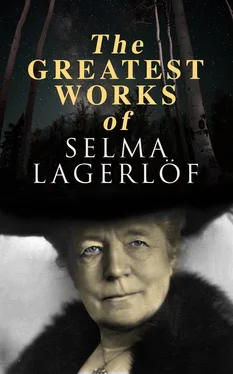Now the boy saw distinctly—in the glass—that the chest-lid was open. He could not understand how this had happened, for his mother had closed the chest before she went away. She never would have left that precious chest open when he was at home, alone.
He became low-spirited and apprehensive. He was afraid that a thief had sneaked his way into the cottage. He didn't dare to move; but sat still and stared into the looking-glass.
While he sat there and waited for the thief to make his appearance, he began to wonder what that dark shadow was which fell across the edge of the chest. He looked and looked—and did not want to believe his eyes. But the thing, which at first seemed shadowy, became more and more clear to him; and soon he saw that it was something real. It was no less a thing than an elf who sat there—astride the edge of the chest!
To be sure, the boy had heard stories about elves, but he had never dreamed that they were such tiny creatures. He was no taller than a hand's breadth—this one, who sat on the edge of the chest. He had an old, wrinkled and beardless face, and was dressed in a black frock coat, knee-breeches and a broad-brimmed black hat. He was very trim and smart, with his white laces about the throat and wrist-bands, his buckled shoes, and the bows on his garters. He had taken from the chest an embroidered piece, and sat and looked at the old-fashioned handiwork with such an air of veneration, that he did not observe the boy had awakened.
The boy was somewhat surprised to see the elf, but, on the other hand, he was not particularly frightened. It was impossible to be afraid of one who was so little. And since the elf was so absorbed in his own thoughts that he neither saw nor heard, the boy thought that it would be great fun to play a trick on him; to push him over into the chest and shut the lid on him, or something of that kind.
But the boy was not so courageous that he dared to touch the elf with his hands, instead he looked around the room for something to poke him with. He let his gaze wander from the sofa to the leaf-table; from the leaf-table to the fireplace. He looked at the kettles, then at the coffee-urn, which stood on a shelf, near the fireplace; on the water bucket near the door; and on the spoons and knives and forks and saucers and plates, which could be seen through the half-open cupboard door. He looked at his father's gun, which hung on the wall, beside the portrait of the Danish royal family, and on the geraniums and fuchsias, which blossomed in the window. And last, he caught sight of an old butterfly-snare that hung on the window frame. He had hardly set eyes on that butterfly-snare, before he reached over and snatched it and jumped up and swung it alongside the edge of the chest. He was himself astonished at the luck he had. He hardly knew how he had managed it—but he had actually snared the elf. The poor little chap lay, head downward, in the bottom of the long snare, and could not free himself.
The first moment the boy hadn't the least idea what he should do with his prize. He was only particular to swing the snare backward and forward; to prevent the elf from getting a foothold and clambering up.
The elf began to speak, and begged, oh! so pitifully, for his freedom. He had brought them good luck—these many years—he said, and deserved better treatment. Now, if the boy would set him free, he would give him an old coin, a silver spoon, and a gold penny, as big as the case on his father's silver watch.
The boy didn't think that this was much of an offer; but it so happened—that after he had gotten the elf in his power, he was afraid of him. He felt that he had entered into an agreement with something weird and uncanny; something which did not belong to his world, and he was only too glad to get rid of the horrid thing.
For this reason he agreed at once to the bargain, and held the snare still, so the elf could crawl out of it. But when the elf was almost out of the snare, the boy happened to think that he ought to have bargained for large estates, and all sorts of good things. He should at least have made this stipulation: that the elf must conjure the sermon into his head. "What a fool I was to let him go!" thought he, and began to shake the snare violently, so the elf would tumble down again.
But the instant the boy did this, he received such a stinging box on the ear, that he thought his head would fly in pieces. He was dashed—first against one wall, then against the other; he sank to the floor, and lay there—senseless.
When he awoke, he was alone in the cottage. The chest-lid was down, and the butterfly-snare hung in its usual place by the window. If he had not felt how the right cheek burned, from that box on the ear, he would have been tempted to believe the whole thing had been a dream. "At any rate, father and mother will be sure to insist that it was nothing else," thought he. "They are not likely to make any allowances for that old sermon, on account of the elf. It's best for me to get at that reading again," thought he.
But as he walked toward the table, he noticed something remarkable. It couldn't be possible that the cottage had grown. But why was he obliged to take so many more steps than usual to get to the table? And what was the matter with the chair? It looked no bigger than it did a while ago; but now he had to step on the rung first, and then clamber up in order to reach the seat. It was the same thing with the table. He could not look over the top without climbing to the arm of the chair.
"What in all the world is this?" said the boy. "I believe the elf has bewitched both the armchair and the table—and the whole cottage."
The Commentary lay on the table and, to all appearances, it was not changed; but there must have been something queer about that too, for he could not manage to read a single word of it, without actually standing right in the book itself.
He read a couple of lines, and then he chanced to look up. With that, his glance fell on the looking-glass; and then he cried aloud: "Look! There's another one!"
For in the glass he saw plainly a little, little creature who was dressed in a hood and leather breeches.
"Why, that one is dressed exactly like me!" said the boy, and clasped his hands in astonishment. But then he saw that the thing in the mirror did the same thing. Then he began to pull his hair and pinch his arms and swing round; and instantly he did the same thing after him; he, who was seen in the mirror.
The boy ran around the glass several times, to see if there wasn't a little man hidden behind it, but he found no one there; and then he began to shake with terror. For now he understood that the elf had bewitched him, and that the creature whose image he saw in the glass—was he, himself.
Table of Contents
The boy simply could not make himself believe that he had been transformed into an elf. "It can't be anything but a dream—a queer fancy," thought he. "If I wait a few moments, I'll surely be turned back into a human being again."
He placed himself before the glass and closed his eyes. He opened them again after a couple of minutes, and then expected to find that it had all passed over—but it hadn't. He was—and remained—just as little. In other respects, he was the same as before. The thin, straw-coloured hair; the freckles across his nose; the patches on his leather breeches and the darns on his stockings, were all like themselves, with this exception—that they had become diminished.
No, it would do no good for him to stand still and wait, of this he was certain. He must try something else. And he thought the wisest thing that he could do was to try and find the elf, and make his peace with him.
And while he sought, he cried and prayed and promised everything he could think of. Nevermore would he break his word to anyone; never again would he be naughty; and never, never would he fall asleep again over the sermon. If he might only be a human being once more, he would be such a good and helpful and obedient boy. But no matter how much he promised—it did not help him the least little bit.
Читать дальше












